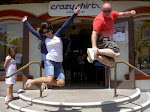What?
When I took the quiz on blackboard to see how I thing people learn best I aligned most with Humanism. I am not quite sure what humanism is, but I personally think that children learn best using the theories from Social Cognitivism. Everything about Social Cognitivism promotes students in learning to manage themselves. In Social Cognitivism Modeling is one of the main components which I think is a huge teaching tool. I don't know that there is a more effective way to learn something than by watching someone model it for you first. I also love that this theory encourages a high self efficacy due to a large emphasis on reciprocal causation. I think reciprocal causation is something we need to be constantly aware of in our classrooms, because we can have a huge impact on that students life depending on what happens in the classroom. I also think that when students learn to self-regulate and self-monitor they will be that much more successful in the classroom. Those are great skills that will always help those students throughout life. I think humanism has something to do with caring about peoples feelings and I think Social Cognitivism does as well. I feel like everything within Social Cognitivism is very positive and is about building up a child's self-esteem and self-efficacy.
So What?
This theory will have a huge impact on how I teach my class. I do think that there is good in every theory and I obviously want to incorporate all of them into my own classroom someday. I think some theories work better for classroom management types of things and some theories work better for promoting learning. I like that Social Cognitivism puts an emphasis on reciprocal causation. As I read about reciprocal causation it just made me realize what a huge impact we can have on our students. I think because of what I know about reciprocal causation I need to always be mindful of my students that are struggling, and really try and understand WHY they are struggling and work through the problem with them. The last thing I want to do is add to the problem so it is important that I make my classroom a nice environment where that student feels good about themselves and feels like they can accomplish the tasks that are given to them, even if they do need some help. I also love the idea of teaching my students self-regulation. I think if I could teach my students that one concept than my school year would go so smoothly. A student that can set a goal and talk themselves through the process, observe themselves in action and make sure they are accomplishing the things they need to, and after they have accomplished the goal be able to reinforce themselves, is a student that will be successful! I am also a big believer in vicarious reinforcement in my own life so I do think it can be used successfully in the classroom. I think that with vicarious reinforcement it is important to make sure you are not being damaging to a student by announcing to the class something you observed them doing that you did not like. I think vicarious positive reinforcement is wonderful and should be used often. I would definitely use that in my classroom to help cue the students on what they should be doing, and what behaviors I like to see from them.
Now What?
The next steps for me to take are to just keep learning and applying things in the classroom. I love studying educational psychology and definitely think it is something I will continue to study on my own. I would like to learn more about the different learning theories, and am just really excited to get into a classroom and put some of them into practice to see what works best for me. I think I could improve in all areas of ed psych! There is so much to learn and I still know so little. I am grateful I at least now have a foundation to build onto. I would like to study more specifically about Erickson, Piaget, and Vygotskys theories. This whole semester in every class when I would learn something I felt like it always went back to those three theories so I would love to find out more about them and how to use their discoveries in my classroom more effectively.
Subscribe to:
Post Comments (Atom)

No comments:
Post a Comment